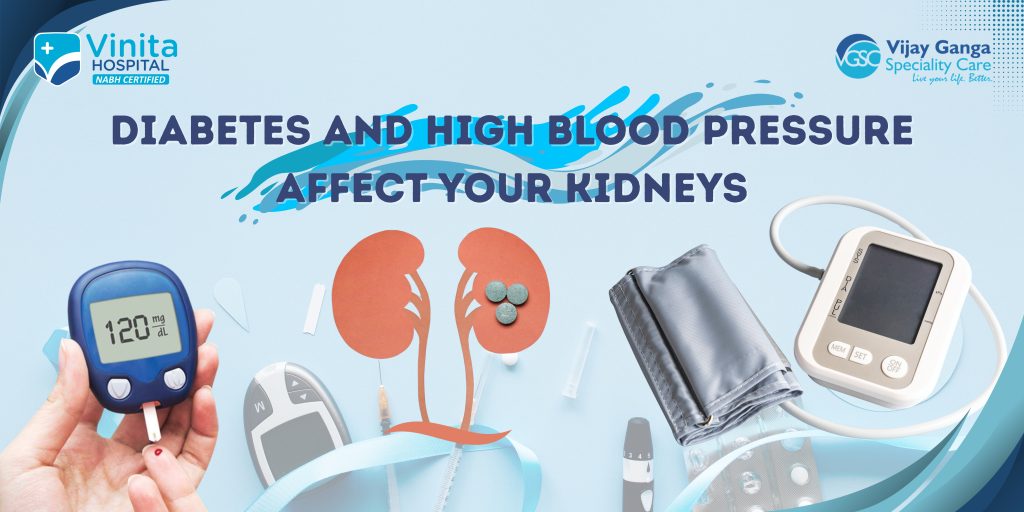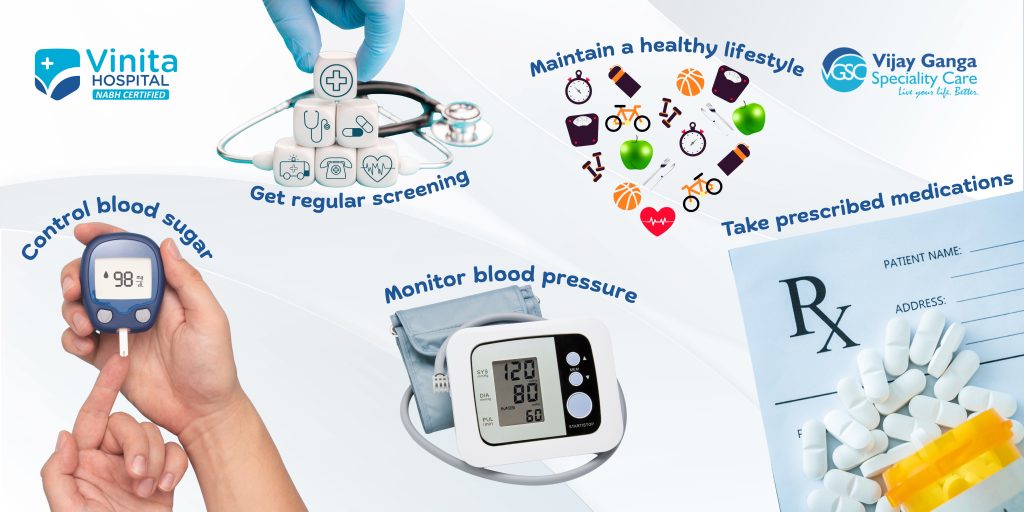
Understanding the Connection
Diabetes and high blood pressure (Hypertension) are leading causes of kidney disease. Together, they can greatly increase the risk of Chronic Kidney Disease (CKD) and kidney failure by damaging the blood vessels and filtration systems in your kidneys.
How Diabetes Harms the Kidneys
- High blood sugar damages the tiny blood vessels in the kidneys, leading to narrowing, clogging, and reduced kidney function.
- Protein begins to leak into the urine, signaling early kidney damage (Diabetic Nephropathy).
- Over time, scar tissue forms and impairs the kidney’s blood filtering ability.
- Both type 1 and type 2 diabetes can cause this, especially with poor long-term blood sugar control.
Stages of Diabetic Nephropathy
- Hyperfiltration : Kidneys work harder.
- Microalbuminuria : Small amounts of protein in the urine.
- Macroalbuminuria : Larger amounts of protein leakage.
- Declining Kidney Function : Reduced filtration rate.
- End-Stage Renal Disease (ESRD) : Kidney failure, requiring dialysis or transplant.
How High Blood Pressure Causes Kidney Damage
- Kidney disease and high blood pressure are closely connected. When the kidneys are damaged, they struggle to control blood pressure. At the same time, high blood pressure can further harm the kidneys. This creates a cycle where one condition makes the other worse over time.
- This reduces their ability to filter waste, creating a cycle where damaged kidneys worsen blood pressure control.
- Hypertension is the second leading cause of kidney failure after diabetes and can progress silently for years.
The Dangerous Cycle
- Diabetes can cause high blood pressure through increased fluid retention and kidney damage.
- Damaged kidneys from hypertension are less able to regulate blood pressure, driving further damage.
Recognizing the Signs of Kidney Damage
Kidney disease usually has no symptoms early on. When symptoms do appear, they may include:
- Swelling (feet, hands, face)
- Fatigue and weakness
- Nausea or poor appetite
- Trouble sleeping or concentrating
- Changes in urination pattern
Prevention and Management

- Control blood sugar : Aim for stable, healthy levels.
- Monitor blood pressure : Target is usually below 130/80 mmHg for those at risk.
- Take prescribed medications : ACE inhibitors or ARBs are commonly used for kidney protection.
- Maintain a healthy lifestyle : Eat a balanced, low-salt diet, Exercise regularly, Avoid tobacco and limit alcohol.
- Get regular screening : Urine and blood tests detect early damage.
Key Facts at a Glance
| Risk Factor | Effect on Kidneys | Prevention |
| Diabetes | Damages blood vessels lining casusing protein leakage | Control blood glucose, medications |
| High Blood Pressure | Narrows vessels, reduces function | Lower BP, healthy lifestyle, medications |
| Both | Accelerated kidney decline, more ESRD risk | Intensive management and monitoring |
Check out Best Multispeciality Hospital in Chennai
Check out Best Diabetologist in Chennai





